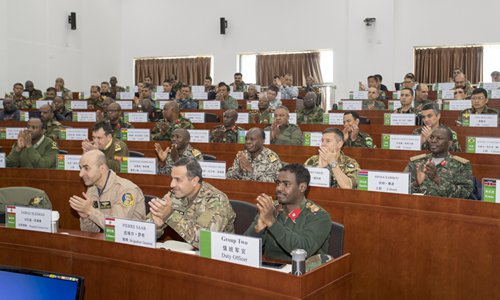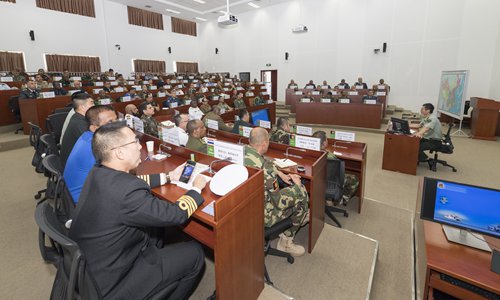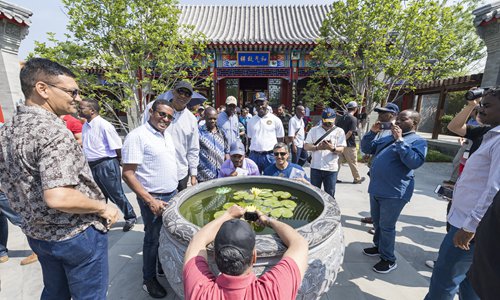
○ China's top military college has a long history training overseas senior military officers, boosting ties and trust
○ The expanding training scale reflects China's military status on the international stage and has become a barometer of China's diplomatic relations
○ Foreign military officers have recognized China's efforts to safeguard its public's wellbeing and protect human rights, after receiving the opportunity to visit Chinese prisons and military facilities
The National Defense University of the People's Liberation Army (NDU, PLA), China's top military college directly under the leadership of the Central Military Commission (CMC), was one of the first Chinese colleges to provide training to foreign military officers, having done so since 1956.
More than 300 foreign and Chinese military officers celebrated the 70th anniversary of the founding of the People's Republic of China together, wearing T-shirts with the words "I love you, China!" at the International College of Defense Studies (ICDS), NDU, PLA, in Beijing ahead of the National Day, and sent their best wishes for the prosperity of China's military.
The college has trained more than 10,000 senior command officers from more than 160 countries over the past decades, including more than 300 national military heads and eight individuals who later became state presidents of their countries. It is one of the largest educational platforms for international military training offered by developing countries, Cai Jinsong, vice president of ICDS, told the Global Times.
"Military exchanges are often the last card in diplomatic relations, a ballast in diplomatic relations. Even if two countries are engaged in a political confrontation or territorial dispute, as long as their military exchanges continue, it is a positive sign that there is still room for mutual trust," Chai Jianzhong, a professor at ICDS with more than 30 years of experience training foreign military officers, told the Global Times.

70 years of improvements
China proposed the idea of offering training for foreign military officers at the very beginning of the founding of the People's Republic of China. Vietnam was the first country to receive military training from China, but at that time China's training system was not yet fully developed, and training sessions were very informal, Cai told the Global Times.
As the system advanced, the courses became more diverse and trainees came from various continents. The level of trainees was also constantly improving, and the majority of participants are now colonel-level officers. Many later become emissaries friendly to China. Some had defended China's legitimate interests on key issues such as voting to restore China's legal status in the United Nations in 1971.
Countries that participate in the training are also becoming increasingly diverse. In addition to trainees who come from countries that are traditionally allies of China, the number of Western countries sending participants has been increasing in recent years.
In the past, trainees were mainly prospective leaders of foreign countries' national liberation movements against Western imperialism or leaders against their dictatorial regime during civil wars, Cai told the Global Times.
The purpose of the training has changed from supporting the struggle for national liberation to supporting the modernization of the countries' national defense and military to improve their combat capability, according to Cai.
"Now in the training programs we place more emphasis on mutual benefit and win-win results. That is to say, countries should not only safeguard national security, but also regional common security," he said.
This can be seen in the changing arrangement of courses over the decades. Specifically, the proportion of courses on traditional security issues has declined, while some courses on non-traditional security problems such as counter-terrorism, the fight against natural disasters, climate change, international financial crises, and other challenges facing humanity today, are increasing in proportion.
"Some countries have more experience in counter-terrorism and peacekeeping than we do…so we asked students in countries like Colombia and Sri Lanka to share their own experiences," Chai told the Global Times.
In terms of global peacekeeping, for example, Ghana, Kenya and some other countries have richer experience than China, according to Chai.
"Their military officers have assumed many senior command roles in peacekeeping forces. We prefer to let the trainees' free discussion lead the class, which also gives us a good learning opportunity, turning from one-way teaching to mutual and shared learning methods," Chai added.
But organizing a large group of military officers from different countries with distinctive religious customs is no easy task. Changes in diplomatic relations inevitably bring contradictions and even conflict.
Affected by border conflict, trainees from two countries once refused to stay on the same floor or eat at the same table when they came to the college for training. The faculty members had several conversations with the two sides, stressing that they were trainees in China first and then advising them to seek common ground with each other.
The Chinese drillmasters attempted to mediate the relationship between the two and, over time, their relationship gradually eased. At their graduation celebrations, one cadet said to the other, "Friend, the last person I want to see on the battlefield is you," Chai recalled.

Understanding China
Many officers have previously been exposed to Western military education before arriving in China. However, most come from developing countries whose national conditions are very different from those of Western countries. Officers said the Chinese strategy opens up a new perspective and provides inspiration.
For officers from developing countries, China represents a rising power, and they want to come to China to see the rapid change, Chai said.
He noted that those officers desire to learn a different China from what is presented in Western media and their visits to China have overturned a lot of their preconceived ideas of the country.
"Many trainees, after visiting prisons and military bases in China, told me that China does better in terms of human rights than many other countries," Chai said.
"Personal experience and visits are the best human rights lessons," Chai said.
Field trips are frequent, giving foreign officers the chance to get a closer view of the Chinese navy and air force operations. Trainees have had opportunities to board Chinese warships and climb into the cockpits of new fighter jets. They are able to learn about conducting battle commands and deploying logistics relying solely on modern information technology.
Foreign officers and soldiers were also invited to observe China's 70th anniversary parade on October 1 to enhance ties and trust.

Hosting friends
China has always treated trainees as friends, providing them with good accommodation and catering standards. Individual foreign officers can use 50-60 square meters of ensuite studio space for free, while officers with dependents can rent family suites at a low price. They can watch dozens of television channels in five foreign languages.
They enjoy three standard, free meals worth 120 yuan ($16.85) per day, and have an allowance of 2,000 yuan per month.
The college offers different dishes according to the customs and religious beliefs of students from various countries.
Trainees' children are placed in international kindergartens governed by the college, and officers can enjoy local medical services free of charge.
A former colonel from an African country came to China full of misunderstanding at the beginning, because he had received a long period of training in the West.
"Knowing that his wife was suffering from infertility, we helped him contact experienced Chinese medicine practitioners. With the treatment of Chinese medicine, [the couple] was able to have a baby," Cai told the Global Times.
"Training for foreign military officers is a very important and great task, which can cultivate military talents for other countries that are friendly to China. China is moving to the center stage and needs more support and understanding from global society. That is how military training can serve as a bridge to bring more trust and friendship," Cai said.
He admitted that foreign training has become increasingly valuable for China's military development in recent years. In the future, the college aims to invite more overseas professors to become part of its training scheme to accelerate the pace of internationalization, he added.









